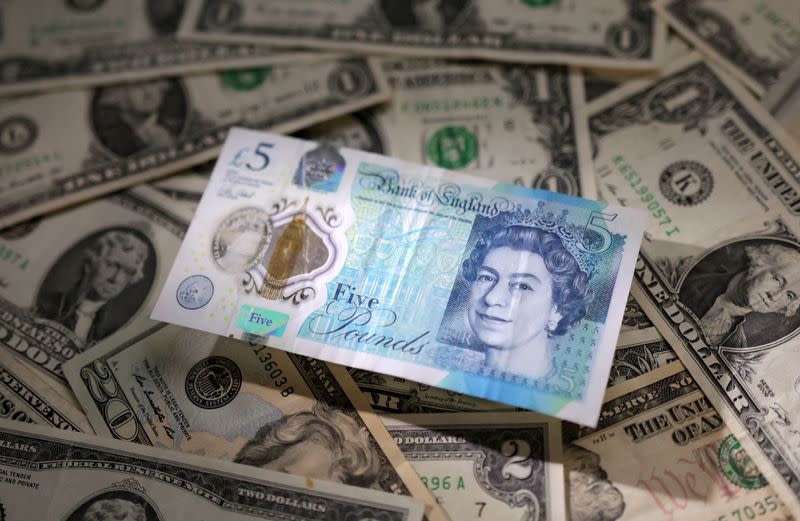Sterling eases after UK inflation slows in October

By Amanda Cooper
LONDON (Reuters) -Sterling eased on Wednesday after data showed British inflation cooled at its fastest pace in more than 30 years in October, reinforcing expectations that the Bank of England (BoE) will be cutting interest rates by the middle of next year.
The British consumer price index (CPI) rose by 4.6% in the 12 months to October, from September's 6.7% increase, according to the Office for National Statistics.
It was the lowest reading in two years and below forecasts for a reading of 4.8%. The drop to 4.6% from 6.7% was also the largest decline in the annual rate since April 1992.
Sterling was last down 0.3% on the day at $1.2463 by 1135 GMT, compared with $1.2487 shortly before the data.
The euro was up 0.1% against the pound at 87.13 pence.
Core inflation, which strips out food and energy prices, also rose less than expected, up 5.7% compared with 6.1% in September, and below estimates for a reading of 5.8%.
"This is a large fall in the headline CPI, but was widely anticipated due to year-on-year effects and falling energy prices; nevertheless, it is good news which confirms the downward trend in inflation," Richard Garland, chief investment strategist at Omnis Investments, said in a note.
"It is likely to mean that the bank is in a good position to begin cutting rates in late 2024, but much depends on the strength of the labour market and the economy," he added.
Inflation has been on a downward path since last October's four-decade high of 11%, but it has proven more stubborn in Britain than elsewhere and is still well above the BoE's target rate of 2%.
ENERGY BILLS
CMC Markets strategist Michael Hewson said UK inflation has remained higher than that elsewhere in part because of how household energy bills were calculated and priced. Consumer electricity prices alone are still 40% above where they were two years ago, according to ONS data.
"Inflation is artificially high relative to Europe and the U.S., but I think you can argue that's a consequence of the fact that we are very much a services-driven economy and wage growth is much higher," he added.
The government of Prime Minister Rishi Sunak pledged this year to halve inflation by the end of 2023, without specifying an outright level.
"Now we are beginning to win the battle against inflation we can move to the next part of our economic plan, which is the long-term growth of the British economy," British finance minister Jeremy Hunt said.
The pound, meanwhile, hit a two-month high the previous day, when it staged its largest one-day rise against the dollar in a year, following U.S. data that showed the smallest annual increase in underlying consumer inflation in two years.
The figures reinforced the view that the U.S. Federal Reserve has probably also finished raising interest rates.
Money markets show traders believe there is a good chance the BoE could start cutting rates by May next year.
But BoE chief economist Huw Pill said on Tuesday that the expected fall in inflation to just under 5% would still leave it "much too high" even if it represented a more than halving in price growth over the past year.
The BoE has sought to stress that it is nowhere near cutting interest rates from their 15-year high, even as the economy flat-lines close to a recession.
(Reporting by Amanda Cooper; Editing by Alun John, Robert Birsel and Alex Richardson)

 Yahoo Finance
Yahoo Finance 